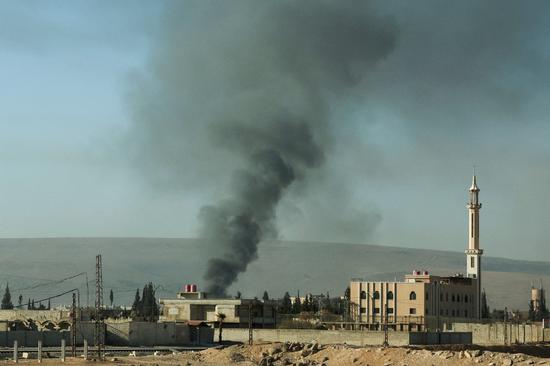Arab countries back Syria transition, slam incursions
Senior diplomats from eight Arab countries affirmed their support on Saturday for a peaceful, inclusive and fair political transition in Syria while denouncing Israeli incursions and bombings in the country.
At the Arab Ministerial Contact Committee on Syria in Aqaba, Jordan, foreign ministers from Bahrain, Egypt, Iraq, Jordan, Lebanon, Qatar, Saudi Arabia and the United Arab Emirates also called for supporting the role of the United Nations envoy to Syria.
They sought necessary resources for establishing a UN mission to assist Syria in supporting and overseeing the political transition process in accordance with the Security Council Resolution 2254.
The diplomats condemned Israeli incursions and attacks on Syria, emphasizing that the Golan Heights is "occupied Arab Syrian land" and calling for an end to the occupation. They demanded urgent action from the UN Security Council to halt Israeli violations of international law, including its military operations in Gaza and Syria.
On Saturday, the Britain-based Syrian Observatory for Human Rights said Israel fired 61 missiles at Syrian military sites in less than five hours on Saturday evening.
Israel has conducted about 800 airstrikes across Syria since the downfall of Bashar al-Assad's government on Dec 8, destroying military capabilities and infrastructure and leaving Syria without air defenses against its attacks, Al Jazeera reported on Sunday.
Abu Mohammad Al-Jolani, who led the military operation that resulted in the collapse of Assad's government, accused Israel of justifying its attacks on Syria in the guise of security concerns.
"Israeli arguments have become weak and no longer justify their recent violations. The Israelis have clearly crossed the lines of engagement in Syria, which poses a threat of unwarranted escalation in the region," he said in an interview published on the website of Syria TV.
In a note to reporters on Thursday, UN Secretary-General Antonio Guterres said he was deeply concerned by "the recent and extensive violations of Syria's sovereignty and territorial integrity", highlighting the urgent need to "de-escalate violence on all fronts throughout Syria".
The 1974 Disengagement of Forces Agreement remains in force, he said, condemning all actions that would be inconsistent with the agreement.
'Vacuum' on border
Israel said on Thursday that the "collapse of the Syrian regime created a vacuum on Israel's border" and in the buffer zone established by the 1974 agreement.
It called the incursion into Syrian territory a limited and temporary measure to ensure border security.
The US has defended the recent Israeli takeover of the Syrian side of the Golan Heights.
Arhama Siddiqa, a research fellow at the Institute of Strategic Studies Islamabad in Pakistan, described the Arab Ministerial Contact Committee's communique on Syria as a polished reiteration of familiar themes: peace, inclusivity and the long-standing principles of UN Security Council Resolution 2254.
The Arab world's post-pandemic pivot toward economic priorities "further explains the cautious, almost superficial approach to Syria", Siddiqa told China Daily.
"Stability is the goal, not out of altruism but necessity — regional peace is a prerequisite for economic recovery and cooperation," she said.
"Inclusivity remains the cornerstone of any genuine resolution, yet it is conspicuously absent in practice.
"Syria's fragmented society demands a process that engages opposition groups, civil society actors and marginalized voices — yet these stakeholders are often sidelined in favor of expedient but fragile agreements," she said.

